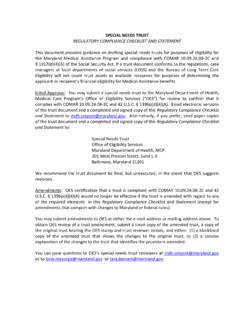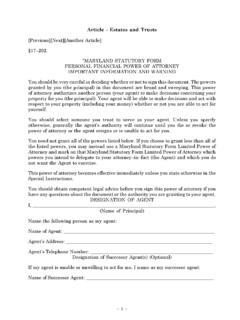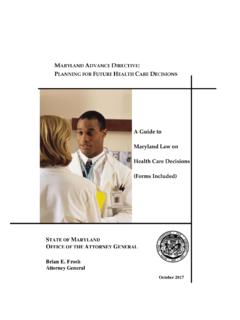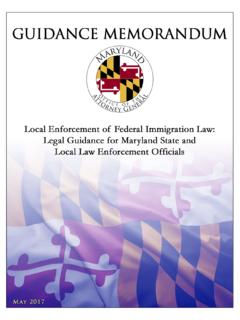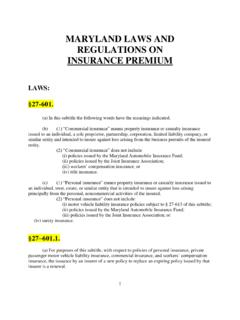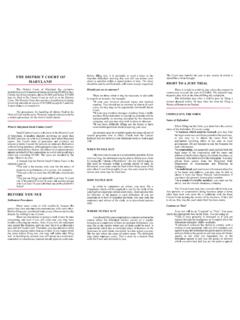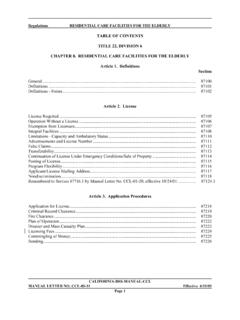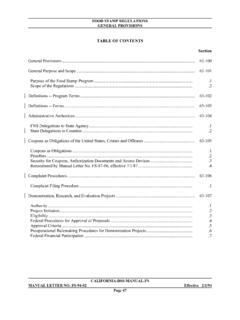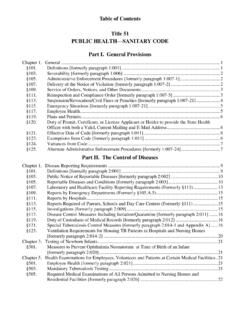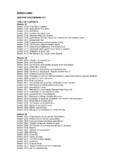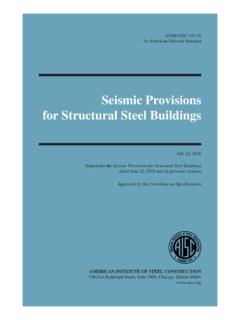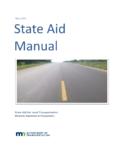Transcription of OPEN MEETINGS ACT MANUAL - Maryland Attorney General
1 OPEN MEETINGS ACT MANUAL OFFICE OF THE Maryland Attorney General BRIAN E. FROSH Attorney General ELEVENTH EDITION (OCTOBER 2022) PREPARED by: OPINIONS and ADVICE DIVISION 200 SAINT PAUL PLACE BALTIMORE, Maryland 21202 (410) 576-6327 WEBSITE: E-MAIL: PREFACE As Supreme Court Justice Louis D. Brandeis famously said, Sunlight is said to be the best of disinfectants. In that spirit, the Maryland Open MEETINGS Act was adopted so that government bodies in the State would open their MEETINGS to the public. Beyond that straightforward premise, however, lie important implementation considerations. Some arise from the rules that govern MEETINGS subject to the Act.
2 Others arise from the exceptions, exclusions, and special definitions that carry out the General Assembly s decisions on which entities in the State do not have to discuss their business in public, which types of public business do not have to be conducted in public, and which topics do not have to be discussed in public. Some of the provisions of the Act are easy to understand and apply; some are not. A few have been construed and explained by the courts; most have not. The overall policy of the Act that it is essential to the maintenance of a democratic society that, except in special and appropriate circumstances.
3 Public business be conducted openly and publicly can get lost in the details. In 1991, fourteen years after the first version of the Act took effect, the General Assembly recognized that public bodies needed guidance on compliance with the Act, and it amended the Act to establish an independent board, the Open MEETINGS Compliance Board, to provide that guidance. The Board was directed to provide guidance by issuing advisory opinions in response to complaints from the public and by conducting educational programs for the staffs and attorneys of public bodies and the local government associations.
4 The Office of the Attorney General was directed to share the education responsibilities and provide staff for the Board. Over the years, the Board has issued advisory opinions on almost every aspect of the Act. Under the aegis of this Office and as resources allow, the Board s staff have conducted seminars on the Act, developed forms and other written guidance, indexed and published the Board s opinions, and, in a collaborative effort with the Institute for Governmental Service and Research at the University of Maryland , developed the online course that public bodies designees may take to fulfill the training requirement now set by the Act.
5 This latest edition of the Open MEETINGS Act MANUAL supplements those efforts. Although it is not a substitute for advice from a public body s own counsel, we hope it gives public bodies some practical guidance on how to comply with the Act. We hope also that this MANUAL , along with the FAQs - A Quick Guide to Maryland s Open MEETINGS Act, provides members of the media and the public with information on what they may expect. Brian E. Frosh Attorney General October 2022 TABLE OF CONTENTS Introduction A.
6 The Open MEETINGS Act its policy and purpose ..i B. Other laws ..ii C. How to use this MANUAL ..ii D. A note about Chapter 1: Applicability of the Act Chapter summary ..1-1 A. Is the entity a public body subject to the Act? ..1-1 B. Is the public body holding a meeting, or did the members instead gather merely by chance, for social reasons, or for some other occasion not intended to evade the Act? ..1-8 C. Is the meeting subject to the Act because the public body is performing a function subject to the Act, or instead exempt because the public body is performing one of the three functions expressly excluded from the Act?
7 1-19 Chapter 2: Notice and Agendas Chapter summary ..2-1 A. Timing ..2-2 B. Format and contents ..2-4 C. Methods of posting notice ..2-5 D. Agenda Chapter 3: Open Meeting Requirement Chapter summary ..3-1 A. The right to observe a meeting ..3-1 B. Access to a physical meeting space ..3-3 C. Access to a teleconference or to a virtual meeting D. Regulation of videotaping and recording; meeting E. Role of the presiding officer; disruptions ..3-8 Chapter 4: Permissibility of Closed Sessions The Exceptions Chapter summary ..4-1 A. The personnel matters exception ..4-2 B. The privacy or reputation exception.
8 4-3 C. The real property acquisition exception ..4-4 D. The business location exception ..4-5 E. The investment of public funds exception ..4-6 F. The marketing of public securities exception ..4-6 G. The legal advice H. The pending or potential litigation exception ..4-8 I. The collective bargaining exception ..4-8 J. The public security exception ..4-9 K. The scholastic, licensing and qualifying examination exception ..4-9 L. The investigative proceeding regarding criminal conduct exception ..4-9 M. The other law exception ..4-10 N. The procurement exception ..4-10 O.
9 The cybersecurity Chapter 5: Conditions for Closing a Meeting Chapter summary ..5-1 A. Before the closed session: closing statement and vote ..5-2 B. During the closed session, the duty to discuss only the disclosed topics ..5-6 C. After the closed session, the disclosure of the events of the session ..5-6 Chapter 6: Meeting Documents Chapter summary ..6-1 A. Written meeting notice ..6-2 B. Meeting minutes open and closed sessions ..6-3 C. Content of D. Closing statement (see also Chapter 5) ..6-10 Chapter 7: Guidance, Judicial Enforcement, and Training Chapter summary ..7-1 A. The Compliance Board.
10 7-2 B. The courts judicial enforcement of the C. The Office of the Attorney General ..7-9 i A. The Open MEETINGS Act its policy and purpose When it adopted the Open MEETINGS Act, the Maryland General Assembly declared the goals to be achieved by ensuring that public business be conducted openly: (1) The ability of the public, its representatives, and the media to attend, report on, and broadcast MEETINGS of public bodies and to witness the phases of the deliberation, policy formation, and decision making of public bodies ensures the accountability of government to the citizens of the State.




